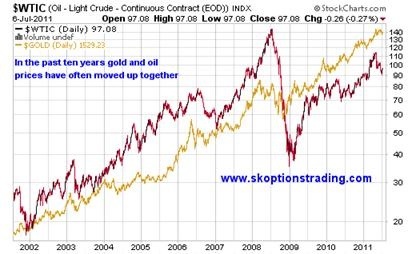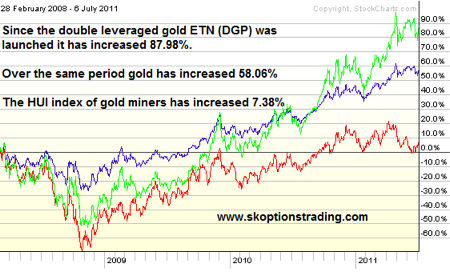First off, let us say that the aim of this article is not to discredit any gold mining or exploration company, or the efforts of the industry. We are not saying there isn't money to be made in the gold mining industry; we're simply saying gold stocks are unsuitable for trading gold and unsuitable for investing in rising gold prices. Many companies may be worth a buy on their own merits, but we do not think they should be bought to gain exposure to rising gold prices. There may be many undervalued gold companies out there, but then the reason for buying them is more on a valuation basis and not as a ploy to profit from rising gold prices. A gold stock may be a good investment, but using it as a vehicle to benefit from rising gold prices is a poor trading strategy. We are not saying that there isn't money to be made from investing and trading gold stocks, but that is a separate issue from using gold stocks to play upwards moves in gold prices.
Why do many people continue to think gold mining/exploration stocks are a good investment to play rising gold prices? Even investors with stellar reputations such as John Paulson have large holdings in gold equities as a way to play rising gold prices, which is puzzling to us. One may be able to defend holding gold stocks if one is managing a mutual fund where by the mandate may prevent you from investing in physical gold or trading derivatives, but with ETFs even this is a very weak argument. This makes Paulson's choice all the more bewildering, as he runs a hedge fund and thus can trade futures, options, whatever he likes (and in fact, he came to fame by trading credit-default swaps).
Investing in gold exploration stocks built purely on the premise that gold prices are going higher is a poor reason to place a trade. The price of the exploration stocks depends far more on whether or not they have the gold, much more than the gold price. If a junior exploration stocks successfully finds a great gold deposit then their stock price will rise, whether the gold price is $1000, $1500 or $2000. In addition to this, it might be 10 years before they actually get the gold out the ground to sell it and who knows what the gold price will be then. It may be that the gold bull market has come and gone long before the explorer gets to sell just 1 ounce of gold.
Picking undervalued stocks is a separate process and area of expertise from that of trading commodities such as gold. If one thinks one can pick gold exploration plays that are going to do well, then one can apply the same reasoning to silver, copper and other metal explorers. If one is good at this it doesn't matter so much if the underlying metal price is going to rise in the next year, as if a company makes a great find it will usually do well, regardless.
An argument often cited by those investing or trading gold stocks is that they could outperform the gold price. The argument goes something like if it costs the company $500/ounce to mine gold and the gold price rises from $1000 to $1500 then the company is making twice as much, whereas the gold price has only increased 50%. It sounds logical. However, in reality the costs of mining are most often rising too.
What's most important about this is that many of the costs of mining gold are actually often positively related with the gold price (e.g., oil prices and gold prices are somewhat positively related; so if the gold price is going higher in coming years, chances are oil prices may well be higher, too, leading to increased fuel costs involved with gold production. Plus, if you're holding gold investments as an inflation hedge, holding gold stocks isn't as good a deal as it may appear because gold miners' costs base will be inflating, too.

On top of this gold is getting harder to find and more expensive to extract when it is found. This is one reason the gold price has been rising—the supply side is constricted and yet it is often cited by people who then go on to recommend investing in the mining industry.
It's rather ironic that one would believe gold prices would rise in part due to mining becoming increasingly difficult and more expensive, but then invest in companies that will suffer from those very factors. The same applies to explorers. If one believes gold is getting harder to find and that will contribute to higher gold prices, why would one invest in companies that are trying to find gold; why not just invest in gold, itself?
Our biggest problem with owning gold stocks: Where is the compensation for the extra risks?
The follow list identifies just some of the risks involved in mining and exploration that we do not think are being adequately compensated for:
- Where is the compensation for Geo-political risk?
Examples: Nationalization of mines, disruption of mining due to conflict- Where is the compensation for managerial risk?
Examples: Management may make poor decisions that have an adverse impact on the stock price, say by acquiring another company at an unfavorable price.- Where is the compensation for labor risk?
Examples: Labor costs may increase; work force may go on strike.- Where is the compensation for technical risk?
Examples: Difficulties mining, problems with the deposit, downwards revision of resources estimates.- Where is the compensation for environmental risk?
Examples: Adverse weather or natural disasters affecting the project(s)- Where is the compensation for tax risk?
Examples: Changes in the tax structure of the country the project is in which reduce its profitability, such as higher taxes or mining specific royalties being imposed.
These risks are not properly compensated for by the performance of mining stocks. Therefore one should not take these risks and should not use gold stocks in an attempt to profit from rising gold prices.

In order for gold stocks to be worthy of an investment, they must outperform the gold price to compensate for the extra risks the investor is taking on. Out-performance is very different from leverage. Gold stocks must increase more when gold prices increase and decrease by less when gold prices decrease. At present even if the gold stocks manage to squeak out larger gains than gold when gold prices increase, they fall far further than gold when prices decrease. This isn't out-performance, it's simply leverage; and in this modern financial world, leverage is cheap and easy. One doesn't need to take the additional risks that gold stocks bring to get leverage to the gold price; one can buy an ETF using margin, buy a leveraged ETN or even a leveraged ETN on margin that will track the gold price almost exactly with a large degree of leverage. Not to mention one could use futures and options to add leverage, too.
Of course, there are some star performers in the junior sector and talented, experienced veterans of the industry may be able to pick some great winners. However overall as a sector it has severely underperformed in our opinion, especially on a risk-adjusted basis. Having a few juniors that rise tenfold isn't good enough for us, since if one is investing in gold explorers, you should own more than a few in order to diversify your risk. Also, if you hold less exploration stocks, you have less chance of holding the one that hits the mother lode. One cannot have it both ways.
This bull market started in 2001, so perhaps there were periods of out-performance by gold stocks. Actually gold stocks stopped outperforming around 2002–2003. The only other period that one would have enjoyed some outperforming is measuring from the 2008 financial crisis low to date, but virtually every stock has done well measuring its performance from then.
We cannot understand why many people will still insist on gold stocks as a viable vehicle for gaining exposure to rising gold prices. Maybe the reasoning was sound 30 years ago, but it isn't now. A possible reason is that gold stocks are interesting to talk and write about. Well something being interesting doesn't interest us; we are interested in maximizing our profits—even if we do not produce reams of research on a myriad of junior explorers for our subscribers. We use options to trade gold, options on GLD, which are easily available and viable for the majority of investors. Our model portfolio has grown at an annualized rate of 117% and we have only used options on gold stocks twice, both of which were bearish and profitable trades. Through using options we can create the leverage we require and through our own efforts at timing the market we believe we offer out-performance as well, since options can allow one to profit if the price goes up, down or even sideways.
In conclusion, we do not think gold stocks are a suitable vehicle for trading gold and we do not think gold stocks make a suitable investment for those wishing to profit from higher gold prices. Gold stocks do not offer adequate compensation for the extra risks involved. They do not outperform. They barely offer leverage and even if they do, that is not enough. Of course, there will be exceptions and opportunities for savvy investors to make money in this industry. However as a whole the entire premise of investing in gold stocks as a way to gain exposure to rising gold prices is flawed, outdated and quite frankly a "barbarous relic."
Our SK OptionTrader model portfolio is up 338.11% since inception and our average return per trade is 40.41%, including losses. In total, we have closed 81 trading recommendations with 78 closed at a profit. A one-year subscription costs just $349 and a six-month subscription costs $199, just $1.10 per day. AutoTrading is now available with SK OptionTrader, made possible by Global AutoTrading. For more information, or to sign up, please visit www.skoptionstrading.com.
Disclaimer: SK Options Trading makes no guarantee or warranty on the accuracy or completeness of the data provided. Nothing contained herein is intended or shall be deemed investment advice, implied or otherwise. This letter represents our views and replicates trades that we are making but nothing more than that. Always consult your registered adviser to assist you with your investments. We accept no liability for any loss arising from the use of the data contained on this letter. Options contain a high level or risks that may result in the loss of part or all invested capital and therefore are suitable for experienced and professional investors and traders only. Past performance is neither a guide, nor guarantee of future success.



























































